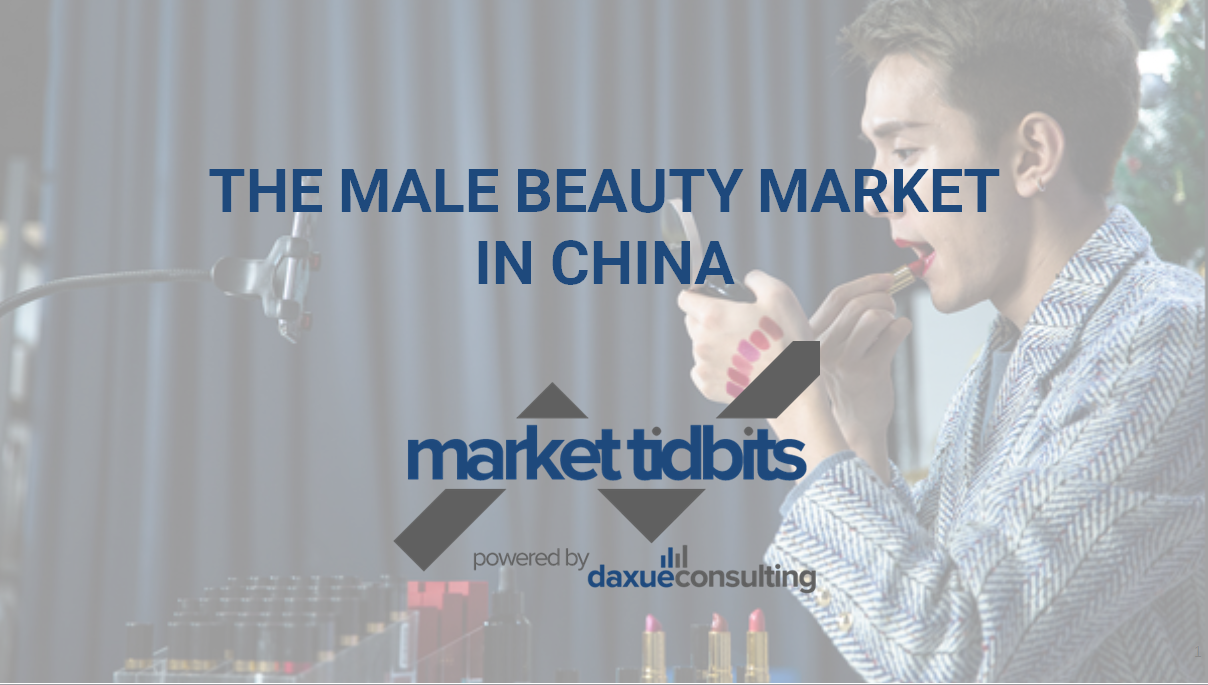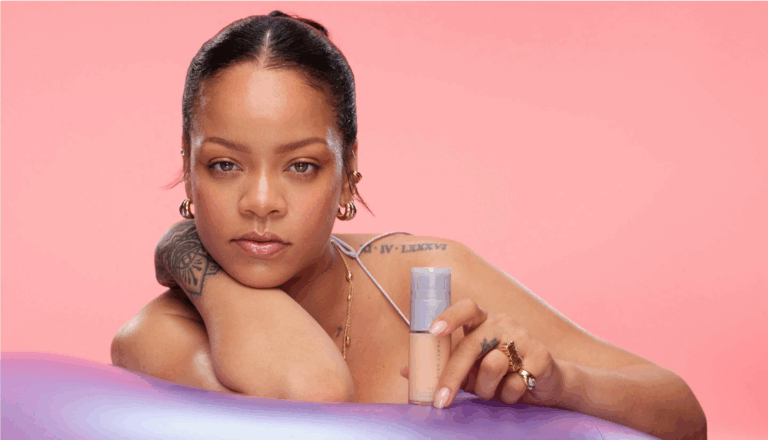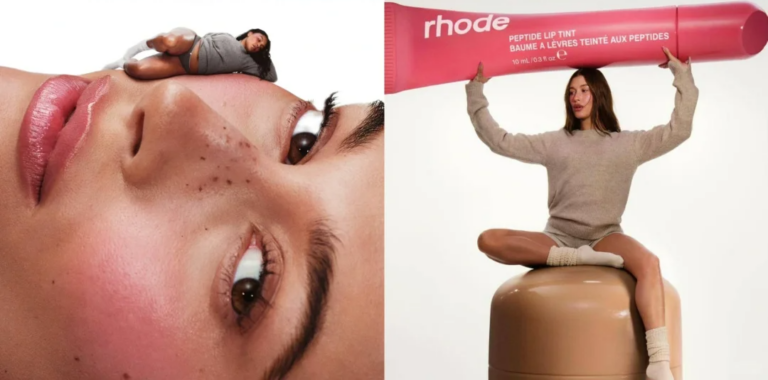Allison Malmsten: Hello everyone, welcome to this weeks Market Tidbits on the Male Beauty market in China. I am here today Steffi Noel, one of the project leaders at Daxue Consulting and I am Allison Malmsten, the media manager at Daxue Consulting.
This week we are focusing on the male beauty market because its growing incredibly fast, much faster than the women’s beauty market and also much faster than most other places in the world. China’s male beauty market is growing at an annual rate of 13.5% which is over double the global average of 5.8%. So Steffi, what are some of the statistics that we see in the blooming male beauty market when it comes to social media, I know that there is a lot of KOL’s that are involved in men’s beauty and there’s been a lot of male KOL’s recently too.
Steffi Noël: Hello Allison, hello everyone – yes indeed like we can see that the male beauty KOL’s, we can see there are a lot now on social media, especially on short video platforms like Kuaishou, Bilibili, Douyin, like we can see that all the beauty KOL’s – so when we talk about beauty we also talk about not only makeup, we also talk about skin care, fragrance, so all the beauty KOL’s, for example on short video platforms, 20% of them are men and on Weibo its 60% of them who are men, so it’s a lot and compared to last year its two times more and they’re talking much more about different kind of topics including a lot of makeup and in the makeup topic they’re talking about – it’s really different kind of products, we can see that later, but its really diversifies content now.
Allison Malmsten: Yes and so its seems that the men’s beauty market – when it comes to the content that we see online, a lot of the content is really focused on personal care and skin care versus make up is quite low, and so for the male beauty market, make up is still an important product, it is very much a rising segment, but personal care and skin care and even nail oil and fragrances are pretty important topics, as more and more men are wearing make up in China and using more cosmetics and putting more effort into their personal care. Also interesting is that there seems to be a lot of controversy around this topic. So we did some social listening to see what exactly are Chinese netizens saying about men who wear makeup in China, because on one hand more and more men are wearing make up in China and the numbers clearly support that and same with the online statistics, but at the same time unfortunately it seems like the GenZ and the current trends are shifting away from supporting LGBTQ Reds and LGBT expressions. So in the west we would associate LGBT expressions often times with cosmetics, especially for men, but it looks like in China they aren’t necessarily same – we’re not necessarily along the same lines. So what are some of the controversial opinions that we have seen in our social listening?
Steffi Noël: Yes I totally agree with you Allison on that part, I think it’s – anyway on social media you can see it’s a bit like everywhere around the world – you can see some controversial opinions saying that wearing makeup makes people feel gay, it’s like I’m doubting his sexual orientation if he wears a bit of makeup but more and more we can see that, not only male beauty KOL’s but also girls, also consumers in general, also just users of social media are raising a bit against this tendency of saying that you are gay because you wear makeup. That’s just like saying – why can’t you wear a bit of makeup or a lot of makeup if you’re a guy? So now on social media there are more and more hashtags rising like in favour of LGBTQ rights (the LGBT Market in China), for example – they’re in Chinese but if we translate them into English it says – who said men can’t wear makeup? Or stronger hashtags like Gender equality and this is really symptomatic of the positive opinions towards LGBTQ rights.
Allison Malmsten: Yeah and what I think is really interesting is to see the hashtag of gender equality come up for this type of topic, because often times when we talk about gender equality its more about finding rights for women and women’s rights, but I think this is more about men’s rights, so I think that’s very interesting turn on things.
When it comes to some of the key characteristics of male beauty consumers, first is the demographics, they’re quite young and they live in tier I and tier II cities. The age distribution is heavily weighted towards 20 to 30 year olds and a part of this is because a lot of these young men, they develop their beauty habits well in college and then now they have been keeping them, so this is going to be an interesting trend and these consumers will definitely age up and it is likely that they will continue to use basic skin care as they age up, but this is definitely something that’s more accepted among young men.
It seems that a lot of men – when it comes to makeup preferences, men tend to prefer lighter makeup, makeup that’s less obvious. What else have you noticed Steffi?
Steffi Noël: Yeah what I think is super interesting is that they prefer light makeup, if you talk about make up, but I think the big trend of – like the blend between skin care and makeup in China – not only for men but also for women, it’s really interesting. It’s like consumers are looking for more benefits for their skin, for more benefits its also the case for haircare for example, skin care, body care, people are looking for more direct benefits to how it can be better to help oily skin to be a bit more dry and those kind of things, and also in the Chinese men beauty market we can see it because the types of makeup they prefer is like the beauty cream and the benefits of looking into makeup is for example to protect them for UV, and also that its sweat proof, that is not of harm to their skin, so this is also a very interesting trend and otherwise in terms of makeup products, mascara which was a bit surprising for me at the very beginning, lipstick, which are more to be clear like natural colours, like nudes, like the colour of your normal lips and also eyebrow pencils and for me these trends, that you have clear eyebrows, also comes a bit from Korea and from having this look that looks natural, so we are still talking bout light makeup but still very elaborated.
Allison Malmsten: Yeah its definitely evident that Chinese men are wearing more light makeup and its less about having an exaggerated colourful look but more about just covering flaws and looking your best for an interview or looking your best for a date and its very interesting that one thing that’s a necessity among men is being waterproof and one reason is because a lot of men tend to sweat a bit more than women and they spend more time outside in the sub, possibly doing more outdoor work and so if they’re wearing makeup they don’t want it running down their face and this is some of the important aspects if you’re going to reach Chinese male consumers.
Another thing we found from our social listening is that Chinese men prefer skin care sets rather than individual items, so often times when women shop for cosmetics they mix and match their favourite brands and go based on the products that they need, based on their own research or watching videos online. For men they like to keep it a little bit more simple. When you search on Xiaohongshu and you look for men’s skin care, all of the top products that come up are skin care sets and they’re all from the same brand and it usually has like a facewash, a lotion and possibly like a toner. So skincare sets is definitely a key marketing strategy to reach the men’s market, and another reason for this is because oftentimes men get their first exposure to skin care through a gift from a female member or from a girlfriend or even perhaps from a friend but skincare sets would make a really good gift and so that is one of the reasons why skincare sets are really popular among men.
Steffi Noël: Yeah and I’d like to add something Allison on that point, I think skincare sets are very important for brands to understand that its really a big opportunity – of course for the gift reason that you mentioned but also because cosmetics are relatively new to men in China, so they really have to learn about the products, which product will match, which product is for which reason and so brands should really take the role of educators, explain them the benefits of each product, when to use which one – after lotion, before the toner – so, this is also the objective of these sets I think.
Allison Malmsten: Yes that’s definitely true, as it is not yet a mature market – the men’s skin care market, education is very important for brands, the consumer base first needs to learn how to use the product and learn what they’re for, so brands do need to play a role in educating what does a lotion do, what does a facewash do, what does a toner do, why you need to wear sunscreen and what is the difference between foundation and concealer. All of these topics are new for a lot of men and so brands really have to go put the extra effort to show how to use these products and that’s same with KOL’s.
KOL demonstrations are also very useful, they tend to show demonstrations on how to use the product and they’ll even talk about the science behind the product as well. So, when we talk about how brand actually reach Chinese male beauty consumers, we see some of the trends is that there is co-branding which is often times used to partner with say e-sports games to reach gaming consumers or with sports to reach athletes, then there is also KOL marketing, ecommerce, direct sales and sponsorships. So, Steffi, what else have you noticed when it comes to marketing tactics to reach Chinese male beauty consumers?
Steffi Noël: Yeah when you were talking for example about co-branding, I think its even more relevant for Chinese men because most of them are not completely into spending hours on social media to find the perfect skin care products as we can see sometimes for women in China, especially GenZ. So, brands really have to be innovative in finding good touch points to reach them in a natural way. So, for example we had Loreal who partnered with We Fire which is a game very popular among men in China, owned by TenCent’s. Biotherm also did something kind of innovative to me, they did like an escape room to promote an anti-ageing cream and also the brand DF which is also doing a lot of skin care for men, which was like the first Chinese male beauty brand in the market actually, they partnered with Xbox from Microsoft to launch customized sets. So, this is really trendy, co-branding and finding the right touch points so that they look more native and more in the natural way and they don’t look too pop up, to annoying for them who are maybe not into skincare and makeup all the time.
Allison Malmsten: Right those are all really good points, it is super important for male beauty brands to cobrand and sponsor, like for example JVR another popular Chinese skin care brand, it partners with MTV to get some TV ad spots on their shows and then also Nivea house partnered with Durex, because a lot of male consumers they will not directly search for skin care products and if they do, they might now know as much and they might not know which brands to look for or even what products to look for, so the initial exposure through partnerships is very important and one thing that we find with targeting male beauty consumers is that its important to find their culture or their sub group or often times what we call a tribe, so there is for example the literary youth tribe, these are men who like to read books, they’re usually educated and so you can reach these consumers by partnering with certain TV shows that would appeal to them and then there’s also athletes and what’s popular among a lot of Chinese men is cars, bikes and motorcycles, so for example lab series sponsored a sporting event with the The Lab Series riding team, it was a biking event and these are very important to reach those male consumers, even more important like Steffi said, to reach male consumers than female consumers.
So, when it comes to reaching male beauty consumers, what would be some advice that you have for beauty brands Steffi?
Steffi Noël: The right education, I would say one element to keep in mind for foreign brands or Chinese brands to target male consumers for make up products or beauty products is also think about women. So first is targeting women who will buy men’s skin care product for their partners or for their family for example, for them they will look at – if its makeup they will look at the benefits behind the makeup products, like the skin care benefits and they’ll also look a lot at the packages because they want to offer it of course – to make sure you have good packages, maybe with a catch of romanticism behind it like this is important and the second thing is – even if men will buy the product by themselves we have found through the social listening, but it was also a bit surprising that some keywords like female validation, my girlfriend told me, my girlfriend agreed, my girlfriend validated my look, validated my product, it’s really important for some of the male consumers in China to have validation from the girlfriend or even from their friends who are women, so I think, keeping in mind that even if you target male consumers, women are a bit behind it or are going to validate some looks or some products men are going to buy, so you have to keep in mind that you have to convince not only men but also women.
Allison Malmsten: Yes that’s true and also from the same social listening we saw that performance and confidence were also some keywords, which is definitely different from female beauty consumers. What else I think is really surprising and possibly the most different from female beauty consumers is emphasis on the topic of convenience and so beauty routines for men will be something that – not that they’ll focus a lot of time on and it’s something that they would want to quickly squeeze in before work and before bed, and so being easy to use and being quick is very important for the men consumers. A lot of these male consumers they’re night owls, possibly staying up gaming or staying up working or doing homework and so they need to get as much sleep as they can and so they don’t want to wake up extra early just to have really, really nice skincare routine. They’d rather have a really nice skin care routine in less than five minutes.
So that’s it for today, I hope you’ve learnt a lot about China’s rising male beauty market. I know I sure did. If you’d like to download our full report on the Chinese male beauty market, you can find it on our website, you can also find it on our SlideShare and we have also shared it on our LinkedIn. So that’s daxueconsulting.com and daxueconsulting’s LinkedIn or you can go on to SlideShare and type in daxueconsulting. Thank you so much Steffi for participating in this podcast today
Steffi Noël: Thank you everyone, thank you Allison.
Allison Malmsten: Thank you everyone for tuning in
Read our full report about the market for men’s beauty products in China





